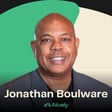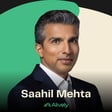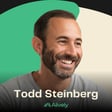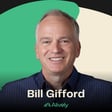The Role of Circumstances and Agency in Happiness
00:00:00
Speaker
There's just such evidence around what it takes, quote unquote, to to you know be happy. And only 10% of you know what happens to us in terms of circumstance is really responsible for our happiness, which we think it's way more, but it's not as big of a deal as we think. and it's That leaves us, we could split the difference in terms of some of the numbers, but 40% is left to us. and That's ah like accounting for it back to genetics and circumstance. and so That's intentional activity that we get to adjust. I just find that agency intoxicating.
00:00:31
Speaker
You know, in a world where it's like, it's all we have. Why squander it? And I think that this is part of my sort of ethos about this idea about life short. How could we ever get to the end and not do it justice?
Profiles of Health and Wellness Models
00:00:46
Speaker
This is the Home of Health spam podcast, where we profile health and wellness role models, sharing their stories and the tools, practices and routines they use to live a lively life.
00:01:00
Speaker
Jodi, I am so excited to be here with you on a Monday, as the case may be. How are you today? Hey, it's a Monday. I mean, I woke up alive, life's pretty good, and I'm excited to be here with you. It's hard to beat that. So speaking of being alive, how would you describe yourself before we start labeling and everything? How would you describe yourself?
00:01:20
Speaker
Yeah. Well, I would say that I'm a lively speaker and author. That's how I would describe myself today. Okay. And to the audience, I think you will discover she is much more than that as we jump in. um But that that's a great place to start.
Conscious Living: Balancing Adventure and Needs
00:01:37
Speaker
So when you think of living a lively life, like this is ah a phrase that you use a lot in your phenomenal blog. What does that mean to you? What does living a lively life mean to you? I get it can be different to different people, but for you. Yeah.
00:01:52
Speaker
Well, thanks for asking for it. And I feel like how you even disqualified it by saying, what does it mean to me? Um, because I sometimes trip up where, you know, I will be talking about, you know, living with aliveness and I call it astonishingly alive living. Okay. So like, we're really getting descriptive here. And in doing that, I, it's one part encouraging, but another part, like some people think, well, wait a minute, like, what if my kind of quiet life doesn't qualify as astonishing? Cause it does sound like it needs to be grandiose. And here's where.
00:02:21
Speaker
I just want to say holy cow, like it's all relative. So the way you asked it of me meant was cool because it's like, what does it mean for me, which is different from you, which is different from you know the triathlete. So living a lively, living an astonishingly alive life.
00:02:38
Speaker
is when I'm consciously aware that I am giving it a go and that I'm balancing for me what I've really come clear on of what my needs are about how much I need in terms of adventure or social time because I'm a bit of an introvert in a homebody like I would rather be at home on the couch you know with my husband and cat and a glass of wine and a fuzzy blanket like in Netflix like that to me is quite frankly, like the makings of an amazing Friday night. However, I can't do that too many Friday nights in a row where I start to feel dead inside. And so it's this conscious tapping into like, what is it that makes me feel like I have participated?
Social Life vs. Personal Time: Finding Equilibrium
00:03:17
Speaker
And yet what also makes me feel like I'm not overrun because all of a sudden I was trying to do too much. So it's like this consistent recalibration.
00:03:24
Speaker
I love that freezing because it the Netflix and couch example is really powerful to me because I always say to people, look, the easier answer is always going to be sitting on the couch watching. And yet if you get to the end of a year or a life and that's all it was.
00:03:42
Speaker
and That's sad. right like you You really, really missed out. But what that rate balance is, what that rate equilibrium is, is going to be different to you personally. What is the rate ratio? Yeah. Yeah. And I've even gotten a little bit prescriptive. Like, you know, this is kind of my business. And so I experiment on myself. Usually I don't get harmed in the process. But it's this awareness of like, all right, like I know my doses.
00:04:08
Speaker
So I know maybe it's like an athlete or maybe, I don't know if you're on the bad side, it's like a drug dealer. Like I know how much I need in terms of in a given month, how many moments of like like social interactions, like lunches with a friend, like after we're done chatting, I'm going to go meet a friend for a lunch and I'm excited about that. But if I had that also tomorrow and the next day, I would feel overwhelmed. And so for me, I know how much I need in terms of like get outside time or learning time.
00:04:37
Speaker
To figure out and like take a course or do something new or creative time to draw or write or whatnot. So it gets a little bit to the point where like I want to get ahead of the curve where I don't know about you, but I've I mean, this is kind of like the way I think we live our lives where we have to like.
Scheduling Creativity to Avoid Monotony
00:04:52
Speaker
Kind of course correct sometimes because we get off path or like, you know, other cool stuff comes up and derails us. But I know there's that weird feeling in life where, for example, you know, I feel like something's missing and it's something's off. And it's that, wait a minute, you know, I haven't maybe been as creative as I've learned I need to be lately. And if I look at my calendar, which is where everything gets scheduled, I have to schedule my aliveness, unfortunately, but it is a glamorous, but it's true. But then, like, well, well, duh, like, when was the last time I actually got the chance to you know, be, you know, to make something or to, you know, in my world, that's usually about writing these days. yeah And so when I realized that I've had like several, several days go by, like, well, duh, you're missing oxygen that helps you feel alive. So that hits me on two different levels there. Because one is we have the best laid plans and then golf course.
00:05:41
Speaker
And so my practice is on the Friday before i I don't just look back, I look forward to the next week. And if I have to shift things around, because I know the balance, and I also have in my calendar, here's the balance, here's how much time I want with clients, right? Here's how much time I want with my family. So my calendar is bought from 5.30am till I go to bed at nine, and I have my blocks. But there's a separate piece of going off, which I think you're also touching on, that for me, seasonally, it changes.
00:06:08
Speaker
And so what may have been right three months ago or six months ago, isn't the right balance for me right now? Isn't the right equilibrium is where I like to use it. Warren sit balance implies equality, whereas is equilibrium i'm saying, Hey, the point that's actually right for me may not be 50, maybe 60, 40 or 95, five, depending Yeah. Well, can I
Quarterly Life Resets and Adaptation
00:06:28
Speaker
ask you a question? Cause this is, I love this so much that it hurts. Like you're spending time on the Friday. I know this about you that you do that, which is a cool life, you know, habit, which we could talk about habits in a sec cause you know, love, hate relationship with them. Um, but do you, how do you do the macro thing where like when you're sitting down doing your woo next week in my life that you're making a conscious accommodation for the seasonal shift? How does that happen?
00:06:53
Speaker
Yeah, so the the seasonal shift accommodation is doing a quarterly reset. So, you know, I do the zero based calendaring, and it wasn't this one and done approach is saying, Hey, today, this is how I want to live my life. And then I have a separate each quarter, hey, I'm going to take this four hour block and really go build it out again. Now, that could happen ahead of time. If I go through several weeks, like this is just not looking right. And so then instead of just saying I'm failing all the time, saying has something changed? Do I need to reassess what my priorities are? And maybe now is the time I did it wrong the first time or maybe I did it right, but that was only right for a month and I need to go redo it.
00:07:34
Speaker
Right. Yeah, I love that. So there's the quarterly deeper dive, broader thought. Forcing. I put that as a forcing, just like the Fridays of forcing mechanism to review the week. The quarterly is a forcing mechanism to say, hey, don't just slide in to what was right three years ago is right today. Yeah.
Recognizing Time's Value for Deliberate Living
00:07:50
Speaker
Yeah. You know, yeah I love listening to you because I think what we're talking about is like choosing to live on purpose, right? Like being really thoughtful and deliberate. Cause you know, like in my language, like we only get so much time, you know, our 4,000 Mondays, so might as well make them count in a way that's thoughtful rather than looking back and going, Oh my gosh, I think I might've squandered spring, you know, in a way that like, I just kind of sleepwalk through it, right? We've all been there. So for the way you're talking about it too, this,
00:08:19
Speaker
planning, it makes me also think just in the as a counterbalance to it because I like a good plan. Otherwise, my life doesn't happen the way that I would love for it to. But then I also have these nigglings as a little bit of like a rule follower. I also have these yearnings for but I still want spontaneity. you know And so I feel like this is like a like ah um a commercial also for, and yet even within the framework, we can do this thing where like as busy, successful professionals, I think we can succumb too much to the very schedule that was designed to make us happy, which like, this is a really good thing. And yet also it's like, wait a minute, I'm going to bust the plan this weekend and just do XYZ.
00:09:00
Speaker
Yeah, I mean, that whole discipline will set you free, right? And so don't let the discipline become shackles that gets in the way of exactly what you're trying to pursue. So for example, I did a week long trip with my daughter to New York. No, there there was 100% of the time, it was just that it was whatever she wanted to do, we were doing the thing, it's the calendar goes out, because I've deliberately said, hey, no, this huge bucket is going to this. And so it, but because the other 51 weeks,
00:09:30
Speaker
I was so consistent, I felt totally comfortable doing that. I've lined myself up before and I know I can get back to it after. So this week, this is all yours. Yeah. Yeah. I think about all the people that I've worked with over time or like in workshops where this does seem to come up a lot. You're making me have this aha in the moment. This is like real time epiphany where, you know, many of us have, you know, a life that has been organized in a way that leads to
Personal Journey: Nutrition and Eating Disorders
00:09:56
Speaker
success. And so it's been sort of, it has been planned and so many successful folks along the way have this
00:10:05
Speaker
this desire for like i just i just want to be told pack my bags and then we're just gonna go away for the weekend and i think what you just described is so cool it's that you can earn the rights to be. Carefree and fancy free cuz it has like it but it's bound to your your your sandbox is within the the confines of a life that you know you can trust is generally well organized for you so i like this kind of the the.
00:10:30
Speaker
I don't know. You can't see me now if you're not like watching, but like I'm moving in a very weird way, like willy-nilly. I think the insights are going to keep coming. and like I like the way you think. Just read the book. I was very excited to connect with you. Well, thank you. but yeah yeah i think i'm going If we keep talking, I'm going to have way too many notes. I'm already writing on my sticky notes. Obviously, with you only die once you you know and in you're speaking and everything. You're known around mindset.
00:11:00
Speaker
But one thing you talk about in the book, and I hope you're comfortable diving in here, is earlier in your life, having struggled with an eating disorder, which I get is also a mindset thing. But thinking on the nutrition side of things now, right? Like what you know now, how do you think about nourishing and fueling your body?
00:11:21
Speaker
What does that mean to you? Oh, man. what ah and By the way, I like how you just like dive right into the heart of it. It's so um it's helpful. i mean hey Times of the essence. hu you know I have so many thoughts and feelings and opinions on you know nutrition as a part of you know living this full life. and so yeah I had a decade where I was just oh I mean man I was held sort of captive by myself with um initially anorexia and then it got into you know the full blown messy bulimia and then a little bit of back and forth just for the variety platter. and I now see with such clarity through the decade of how you know there would be some times where I would think that I've got a handle on this. you know I'd go to a different sort of therapist for example.
00:12:04
Speaker
And now I look back on it and I think, oh, young child, you just didn't know you know. I would think that for you know if I was, for example, bulimic for a phase of, say, six months,
00:12:15
Speaker
I would go back to um eating, but refraining and restricting. And I would think, yay, I'm better now because I wasn't barfing my brains out. Well, wow, I guess that's one badge of honor, but it's still not going to set you up for a life where you feel alive and you can literally function at your optimal best. So I think one of the main things I've learned, you know the trick for me, not a trick,
00:12:40
Speaker
The actual steps for success for me getting better in 2019 was a combination of therapy, nutrition, and it was the nutrition that was game changing. you know and And I have been very obsessed with nutrition my whole life, but to the point where it was like um favoring, obviously, the less is more approach and the restrictiveness, which only leads to craziness.
00:13:03
Speaker
you know like like You know, the only time I think scarcity works is maybe where we'll talk about it in terms of acknowledging that your life is limited because that's the motivating thing to help you get on with your dreams because you ain't got all the time in the world. But other than that, scarcity, like limiting is not good. And I learned to eat again.
00:13:20
Speaker
And it sounds ridiculous that in my forties, I had to learn to eat again because I was the one that knew everything about nutrition. Yeah. But I was abusing it. You know, that funny feeling where like you can know something, but you are like confirmation, biasing the crap out of like the thing you want to know was like no carbs or like, oh, like just silly goofy stuff. So it was very helpful. And my husband was amazing where we would like, like I'd be measuring my rice.
00:13:46
Speaker
I wasn't quite measuring it by the ounce, but I was measuring it by the cup and recognizing like this is fuel for life, not fuel, not so much fuel. I mean, I could even look at it. I think it's still a nice holistic approach to see it as fueled to allow me to go for my walk in the morning. But that is life. like That's code for life. But it wasn't fuel for my body to look a certain way. um It was all just about back to a aliveness. So yeah, that was really the the relationship between having to relearn, be open to relearning, because, man, I think I was stubborn for a long time. like No, I know it all. No, you don't.
00:14:25
Speaker
ah you know it all, but how how's that working out for you? So you you had this period
Balanced Eating: Enjoyment Without Guilt
00:14:30
Speaker
where you know the rules, the science, and you know all these pieces around it, and then how it got in the way of living the life you wanted. yeah So what does that look like now? you know Because it's it's one of those things I'm curious of You're not going to go eat a pint of Ben and Jerry's every night. I wouldn't imagine. it and But there's it's back to that discipline and freedom of like, hey, I know the fuel the the foods that fuel me and get me energy and make me feel good. And I know it's not a cheat. It's a treat in their times to treat myself. like how How does that all come together now after everything you've been through?
00:15:12
Speaker
Yeah, the relationship is completely resolved when there are just enough calories. So I believe, for me, and I think this is true for many people, maybe not for everybody, but the crazy talk in the head of, could I, should I, like, trust me, I can do some damage with a pint of Ben & Jerry's. Have you been around Cherry Garcia? Yeah, the food's probably more on my speed, but I like Cherry. Really? Okay, I think there's gluten in that one. I can't do that one, damn it.
00:15:39
Speaker
um that when there's enough intake, enough to just resolve, like there's got to be a mazzle of higher kidneys inside our little nutrition system in our bodies, right? Like when your body learns to say, it's okay sweetheart, like I know you're not going to be in nutritional peril come this evening because you won't have had enough literally nutrients to function or to just ravage your own body for for some kind of energy. Then I feel like it's a lot easier to be able to make a decision and say tonight's a dessert kind of night.
00:16:10
Speaker
And the deprivation thing, I think, is the is where the problem comes up. Every time I've deprived myself in pursuit of trying to quote-unquote, well, initially it's so maybe to lose weight to change my shape or quote-unquote to be healthier, that's a bunch of BS from me now. It's like, I just know it's a slippery slope I can't go near. So if I know I'm eating enough to sustain, my mind won't go towards the wild side, but then I will be able to say,
00:16:36
Speaker
some Some days I have stuff that is quote-unquote stuff other people would thumb their nose up at. like I spent the first 17 years of my career in the health and wellness business. so I worked in health clubs, ran health clubs. I got to tell you, it's supposed to be around the healthiest people in the world who are ironically often some of the most warped in terms of their perceptions of what good nutrition is and leading healthy lifestyles. Right. So I think I came by that honestly, this sort of judgment of what it meant to have Ben and Jerry's. And once you override that and just say like back to this nutritionist who helped me get better, she was very clear to me that I could have to get a load of this. Tell me what you think. And a lot of people are going to shutter and cower and just that's 20% of my daily calories.
00:17:19
Speaker
could be in garbage. And then when she told me that, I have almost walked out of the room. As long as you're getting the right nutrients so you can supplement you whatever it is, it's better to come from whole foods. But as I understand it, depending what your objectives are, 100% could come from garbage. It's just you're going to get way less to eat, and you're going to be so hungry all the time, right? like Because it's a calories in, calories out thing. So if you're fueling on,
00:17:48
Speaker
whole plants, animals. You're just not going to be that hungry. Your body's going to know. It knows those signals because we've lived that life for a quarter million years as humans.
00:17:59
Speaker
if you're fueling on a handful of Oreos, that may fill your stomach like a single apple. But you just had the calories of an entire 1200-calorie meal. And so your body doesn't know how to process that. It's like, no, no, I need to eat a lot more. And you're like, calorie-wise, I know, but nutrient-wise, I do, because I've got no nutrients from what I just consumed, and it's making me so hungry. Right, right.
00:18:24
Speaker
Yeah, I think I love what you're saying. And I think even like from a choice in the living and saying, okay, like back to permission, because so much of this is like so rule bound. I'm not allowed to have these certain kinds of foods. And I know a lot of friends who is it like orthorexia, where it's just like a very militant approach to only eating.
00:18:42
Speaker
the purest, the cleanest, the so on. Oh, that's not, okay. All right, I didn't even know that had name. Well, it's like a lot of my friends think their daughters don't have eating disorders because, well, they're eating, but they're like, they're very healthy. Everything has to be organic. And that's great, but it's when you take that to an extreme and
Experimenting with Nutritional Supplements
00:19:00
Speaker
you can't touch the thing on your plate because it's not exactly part of this like very, very strictly rule bound way of eating that can only adhere to certain yeah certain standards or qualities, then I think that might be, it for some people, could be an issue. Anyway. It's a discipline as shackles versus yeah discipline as freedom again. actually So, I mean, so the 20% number for me was so freeing. It was like, I get to have a Snickers bar. And that actually isn't even 20% of my day. And I remember thinking that how ghastly is like I could have a chocolate bar a day. And I thought, well,
00:19:35
Speaker
technically could because if everything else i'm eating is very nourishing according to the criteria set forth by my fabulous nutritionist it felt like i get to have this and that's actually a phrase that i use a lot in life not just with food it's about life like We get to do these things. We get to make choices. We get to change our job. We get to move to Connecticut if you want to. ah You get to do and you know so many things. and um and That for me felt like it's just very permission-based and not admonishment-based. and That means that you know last night on the couch, I had Swedish fish and I loved every single one of them.
00:20:11
Speaker
Again, not not my speed, but I know some people love Swedish fish. So you don't have a ton of, you don't have any restrictions, right? Like it's it's just being thoughtful and enjoying and and living. yeah so Do you get all the nutrients you want or are there any supplements you take? Like, hey, you know, I know our soil quality is not great. I top up with magnesium, right? Don't get outside as much as I want.
00:20:34
Speaker
Yeah, so I need to take B12. I've always had problems with B12 and iron, so I will do B12. I'm now in that funny dance between, oh, I have high cholesterol. Thanks, Mom. Rest in peace. Love you. um That came from her side, the high cholesterol problem. um So i now they're getting you know red meat, which would normally be my choice where I would have it every 10 days. Now it's finding alternatives there and I'm actually still in the process of figuring out what that's going to be like. She advised that I try instead of taking medication for um cholesterol, bergamot supplements for a bit. That just wasn't for me. So I will take B12 for sure. For that I will take, you know depending on different times, B vitamin D.
00:21:15
Speaker
depending on what my blood work will look like. And ah you know then it just depends on, quite frankly, what I have read lately that it has been motivating to me. Do I want to do the fish oil capsules? Yeah, you know what? Sure. Or if I watch you know Dan Buettner's Blue Zones, then I might make some different choices in terms of supplements. But generally, i'm more about i'd rough I stubbornly think I'd rather eat it. But I also know, like well, obviously, I'll supplement if I have to. yeah And with it cutting back on the red meat, do you supplement with protein at all, or you still just try to get that from everybody else? I'm supplementing with different proteins where I can. Like, you know, last night was like Black Beanfest. Okay, but like not a protein powder. You're still doing it. Oh, not a powder. That's a good good point. No, i I'm kind of, ah i'm I'm in the um protein curious phase of like what it would look like to do some supplements. And no collagen peptides. No. My nails and hair want collagen, let me tell you.
00:22:12
Speaker
So then why don't why don't you add those in? You know what? As of this conversation, I'm writing it down on my sticky notes. Yeah, it was so my, my co-founder Lou in a lively, his wife got him to start taking them.
00:22:24
Speaker
And at some point, it like a month or two later, he's like, oh my God, my nails, they're just growing so fast. Like what's going on? She's like, you dummy, you've been taking collagen for too much. That's why. ah They don't seem to still fully understand the mechanism for it, but it seems to work for hair and nails and some skin. So two things, this is supposed to be about your routine, but since you just said you're curious on some of these things, I won't throw out there. ah So for iron, sarsaparilla,
00:22:50
Speaker
I don't know if you've ever looked at it, but it actually helps on iron. So you can just like put it in the tea in the morning. Sarsaparilla powder is another way to to supplement and get that iron. I started doing it because I don't need much meat. Yes, entirely. fundbased And then the other one on cholesterol.
00:23:06
Speaker
yeah that I just put two other people in today is AMWA, A-M-L-A. It's Chinese gooseberry. it's basically free it's It's dirt cheap. And within a month, my Apo-B went down 10 points. Somebody else was like, oh, I was doing this for four months. My Apo-B went from 120 to 61 or something. And there's there's research behind it. And it's just this ground Chinese gooseberry powder. It's it's better. But the effects, right? There are no side effects. that You're not on a statin. You're not having to do this. its natural thing So it is something I'm very excited about these days.
00:23:39
Speaker
Oh, I love that hot tip. All right. My sticky note is almost full. Keep going. So you talked about, uh, as we were going through the nutrition, I get to, I get to know. There are a lot of people saying, Oh, I wish I could do this with this, right? Like feeling this lack of agency. And what I try to explain to people is no, you have a hundred percent of the agency in your life when you're saying, I wish I could do that. But what you're saying is I am choosing to prioritize this thing over this thing.
00:24:10
Speaker
And that can be the right answer, but just own it and you're going to be so much happier. but I wish I could go on vacation, but I can't afford it because I have this car payment. I'm like, great. So what you're saying is you prioritize not having your car repossessed more than going on vacation. You're choosing, I get to make this car payment and keep this car. but yeah how did How did you get to that frame of mind? Because it's seemingly rare.
00:24:34
Speaker
yeah Yeah, I love your point because I'm thinking about a couple of other examples of that too um with different people which might be pertinent with me. i i think um You know, it's like when you see life on the other side of something. So I think sometimes you, not that I advocate for having to get to rock bottom in any circumstance. I mean, like that would be really cool as if we don't all have to get to rock bottom with our choices in life in order to have to kind of rise up again. That sounds awfully painful, but this idea of like now I see how it is and could be, and now I just realize like it it is up to me. I've, I've always had a bit of a visceral reaction to the
00:25:14
Speaker
anything veering towards like a victim mindset or because i I fundamentally have a belief that we kind of create what happens around us. and so I've always found it to be encouraging that in the science of positive psychology, which is my background, there's just such evidence around what it takes, quote unquote, to to you know be happy, like to adjust our perception of our life satisfaction. And 50% of it is genetic. So our downer dad or melancholic mom, that might affect our outlook. Similarly, you know if they're upbeat, then we might be too. And only 10% of you know what happens to us in terms of circumstance
00:25:54
Speaker
is really responsible for our happiness, which we think it's way more. but We think that because we weren't born into the rich family, or because we don't live in this certain glorious area, or because, well, obviously, like if a tornado wipes out your home, it's going to affect you for a while. But it's not as big of a deal as we think. and it's That leaves us, we could split the difference in terms of some of the numbers, but 40% is left to us. And that's ah like accounting for it back to genetics and circumstance. And so that's intentional activity that we get to adjust. I just find that agency intoxicating. I think that it's, you know, in a world where it's like, it's all we have that why squander it? And I think that this is part of my sort of ethos about this idea about life short. How could we ever get to the end and not do it justice? So that's about taking intentional action. And so I think that for me, you know, fixing quote unquote,
00:26:47
Speaker
getting help for my eating problems was very much this idea of, yeah, I knew I was sort of down in the pits with it for a long time. And that coming out the other side, it was like that for me was a really good crystal clarity of like, right, I just like i didn't remind her, I need to make the choices that are the healthier ones for me, even if they do feel insurmountable.
00:27:10
Speaker
It's something you you cultivated over time. i think It's not ah this overnight of, hey, I have this. And I try to explain to people when they ask, well, how do you do? x like you You don't go to the gym for one day or one week and be like, OK, I've taken care of physical fitness for my life.
Cultivating Resilience: Mindset as Fitness
00:27:26
Speaker
or I've eaten a salad, and so I'm i'm set, right? It's it's just cheeseburger and fries and rest. And mindset's the same way, right? Like you you've developed it, but what i I like you talked about, and you only did once, are some of these daily reminders and ways that you maintain it over time, right? Like you you can put the structure around, but then how can you make sure you're sticking to that structure? Can you talk, share some of those, the the things that you said. Hey, am am I on course? Hey, I need this trigger.
00:27:54
Speaker
Yeah. Yeah. Thanks for mentioning that because we will adapt to so much and we could just for just a quick second, like lament how we are built as humans. Cause it's really frustrating. You know, you think that, you know, how well, we learned it once that I'm supposed to be in charge of my choices or, you know, I learned it once that like, I should be able to override that negative voice on my head that says, you know, you can't do that. Well, yeah, we need, it's a consistent overriding. Cause I think whether we can acknowledge that maybe we have a default setting or it's a pattern
Mortality as Motivation for Intentional Living
00:28:24
Speaker
or again, and we just, we, we relegate back to this sort of version of a homeostasis that it may just not be super duper for us.
00:28:31
Speaker
So the work I do is getting us to remember that we're gonna die as the, eh, a little bit morbid, but mostly super motivating activator to say, okay, and so therefore, because I have 1,812 Mondays left, it's my number as of this week, as of today,
00:28:50
Speaker
that I don't want to delay a goal or a dream or an idea. And so just like what your point is you've made, like we all know that we are living on, you know, like a finite amount of time here. This isn't new to anybody. And we've all said the thing, oh, life's short and we justify. But yet we continue to go back and take life for granted, right? We continue to go back and live in a version of autopilot. We all do, I do.
00:29:14
Speaker
I do this stuff for a living. This is my mission in life. I talk about it every single day, as loud and as far and as wide as I possibly can. And I still need to be reminded to live. And so the way I do it is I do have the countdown every Monday about reminding myself about, yep, this number, in fact, is one less than it was last week. And it's so and and maybe I won't even get that many. you know That's a physical calendar of it. So it's so it's visual you actually see.
00:29:40
Speaker
I do in Chicago and then here where I am in California. i just Because I am calculating it every week, it is something that I don't have to think about visually. But I am a fan. I know that um Tim Urban on Wait But Why has a great 90. He has like the little squares. You can check them off. You can buy a bunch. There are so many good ones on Etsy. I have a blog post about really cool calendars that remind you of your finitude.
00:30:04
Speaker
But I also have all the visual reminders that are around me like, I mean, this is little as like having like a skull ring all the skulls around me, our glasses are everywhere, um quotes with like framed quotes that are, you know, from either stoic philosophers or whomever else said something kind of inspiring about the fact that like time's ticking. Yeah.
00:30:25
Speaker
It's just got to be ah right now. Those are visual things which, let's be honest, can become wallpaper over time. like You just get used to it. There are some other tips and tricks. There's a fun app called We Croak that you can download for $1.99 a month.
00:30:40
Speaker
And it randomly pops up five times a day to remind you, it says, remember, you're going to die. That's super amusing. yeah um um And then talking about it with friends. Um, usually it's not that appetizing to sit and talk about death. And I'm not talking by the way about your will or your last rights or like what you want at your funeral. I mean, you could do that. That's probably productive.
00:31:03
Speaker
I'm just more interested in the discussion about how, huh, yeah, okay, I've got this much time left. And then I want to flip the script pretty darn quickly to be like, and so what do you want to do with your time? Like what, you know, we all have like a notion of a bucket list. They actually say like 73% of Americans have a bucket list, which I'm very wary of because I love the idea of capturing things you want to do. I think that that's great.
00:31:30
Speaker
But I also feel like sometimes it gives us a false sense of security, like with any goal. And I'm sure you've seen some of this research. There's ah just enough of a bump of satisfaction in ourselves when we make note of the thing we're going to do. Especially if we share it with others. ah Well, no, that will work to maybe hold us accountable.
00:31:48
Speaker
I'm more concerned about when you're like, this is a thing and you fantasize about it and it gives you enough of a lift that you then take no action. That is detrimental to all of our lives and health. Imagining how fit you're going to feel or imagining how good you're going to feel, well, you actually have to go to the gym or you actually have to go do it. You have to go to Prague if that's on your list. You can't just write it down and close your journal and walk away.
00:32:12
Speaker
Yeah, for sure. I hadn't shared this yet. So I went out with a friend of my daughter's yesterday and her kids, and she gave me a bag with a gift. And I didn't open it till this morning. But it was a Taylor Swift friendship bracelet that says Memento Mori. And I was like, there is no perfect timing, other than when I'm sitting down with Jodi, to share that I just got this because bringing to you know, as someone who wrote a book about psoasism,
00:32:38
Speaker
That also quotes Taylor Swift, like, there is no more perfect for me, constant reminder. And so it was ah it was a great launching pad this morning to have the conversation with my daughter. So it was saying, this means a number of death. and And you know how we always talk about there's not good, there's not bad. Death isn't good or bad, it is. And then we get it aside, the story we then tell about it.
00:33:02
Speaker
Is it this terrible thing that ends or is it this amazing thing that makes us appreciate the time that we do get and get more out of it? And so it ah probably heavy for an eight-year-old at seven in the morning, but if you're not going to do it now, when are you going to do it?
00:33:17
Speaker
That is the coolest gift ever. I totally want one. And I like how, like that's a conversation I think that has to start early and go late. Like what there that kind of acceptance is what you're really promoting. It's like a neutral, like equanimity of like, like you said, it just is. And, and I, you know, we're all socialized to avoid it, not talk about it. That's distasteful. It's just, it's obviously a crappy fact, but once we are able to just do that acknowledgement and take some of the sting out of it,
00:33:47
Speaker
Man, like that empower that how empowering it can be to be like, and therefore I will move on with it. like The thought exercise, I know Nietzsche has this exercise, you know the eternal return. I don't know if you come across it in your studies or your readings. like He had this mythical character who's like, imagine that you now are destined to live the life you've lived from the minute you were born up until today on repeat for eternity.
00:34:15
Speaker
again and again. So every high, every low, every everything. And his point, of course, was that the knowledge of this would either crush you, or it would elite you. And for some of us, we might be just a bit indifferent. But really, it's this idea like, wait a minute, like, would I want to do this again and again and again? And then the idea of like, if you did live forever,
00:34:38
Speaker
we'd have zero motivation to get stuff done, right? So we need the end in order to put everything else into this perspective. So you're on it, yeah. Yeah, I love it. You know, I do a lot of open water swimming. And I was explaining to my daughter at the same time, like, look, every time we get in the water, there's a non-zero chance I don't come back out. And that is true for every single one of us. Every night we go to bed, there's a non-zero chance. Like it may be very low, but there's a non-zero chance we don't get And so just thinking how you that last interaction, and I was like, look with your mom, when you get in a fight, there's a reason I say, hey, you'll really regret like, don't go hug her for her, go do it for you. Because you're going to want that. and And just remembering those those last interactions with you, whatever it is, just have it on good terms live.
00:35:28
Speaker
Because you don't know. right you You have the the thousand plus on the wall. That's not guaranteed. Right. Yeah. There's a big asterisk next to that number. Right. That's really cool. when When and how did you first come across this embracing death as a celebration of life, as an impetus for living? You know, no one's ever asked me that question when I first came across it.
00:35:56
Speaker
Well, if I go back in time and I think about, I've always been amused by the notions, for example, of like Carpe Diem, so
Absurdity of Life: Making the Most of Time
00:36:04
Speaker
seizing the day. So I've always been, you know, but I've always worked in self-improvement and development, right? Like whether it's working in fitness for all those billions of years or I'm getting into coaching, I've always liked the idea of like, let's max this out. But the twist, like the plot twist about the fact that this is finite,
00:36:24
Speaker
I think all along the way there was always an amusement again about how absurd it is, you know the branch of philosophy, like absurdism. like like, wait, what? Like, we're all we're all working hard. You know, early days in my career, like I'm helping people to try to feel fit to feel better. And then I'm helping people try to like their lives better. And all this is for what? Like at the end, we're all just gonna die. Like it's just bonkers. And we could drive ourselves crazy or to drink or both, um if we really thought long and hard about it. But then I go, well, that's ironic. I want us to think long and hard about it about the fact
00:37:00
Speaker
But again, in the right in the right context. right So I've always collected the clippings from different philosophers, from different existential psychologists. And I think it was probably um two things. you know My mom died when she was 58. And that was just this, like we all, again, logically, we know these things can happen and do happen. And so that was just a bit of a right. you know ah We don't all get our 4,000 weeks.
00:37:28
Speaker
and then more I think more relevant to my motivation was that when she died, my take on it was that she had just so many dreams unfulfilled because she didn't take a lot of action. So she had so creative all the writings. She was always writing manuscripts and check these business plans that galore. I mean, she was like, like a new, a new plan a month, you know, but she didn't do anything about them. And cleaning up her place after she died was such a,
00:37:59
Speaker
ah a sad experience to witness. Life not, it's not even just like not reached its potential, but just the very bitter taste of regrets of like a life unlived. And that, for me, was something that was very potent. And it got me exploring more. And then when I um went to grad school for the Master of Applied Positive Psychology at UPenn, I made my thesis on this topic of Memento Mori. And that was really cool because it, well, to be super honest, it gave me the confidence to talk about it as more than just an idea. It was like, oh, this is empirically based. So therefore, there's cool. For those of you who care, there's something behind this. um But this idea that um
00:38:39
Speaker
you know, we we we are wired to really respect a deadline. And so it just really comes back to that. Yeah. Tired to respect a deadline. I like that way of phrasing. So you you touched on starting your career in fitness. Yep.
Fitness Routines: Walking and Balancing Exercises
00:38:54
Speaker
And in I would imagine like with nutrition, all these, it can get to a pathology, but in in this living a lively life, what does your fitness routine look like now? Like what what does fitness mean?
00:39:08
Speaker
It's I try to be very accepting and gentle by and meaning by myself with self-compassion because I've already I'm coming out of the gates defensive because there is a part of it that still wants the subject. I can call it. Don't worry. I know that I want to be at a level that I'm not right now, but I'm like.
00:39:26
Speaker
That's cool. I know that I'm in a phase of life now where I am valuing other things more. So I have a really cool routine where I walk before work and after work with my husband about, you know, 30, 40 minutes each. So we get I mean, by the way, that's just that's just ah that to me is like,
00:39:42
Speaker
Yeah, my heart rate goes up. Yeah, we all know the benefits of walking, but it's really just a great time to like center your day, spend time getting caught up. And so it's just it's more like relationship and um different perspective time for life. Oh, and I also happen to get some health benefits. That's good. And then there's a little studio near us that we go when we work it in again about twice a week to do some more serious movement that's not walking. So some weights and moving around and I am working in the when I'm brushing my teeth, taking the two minutes times three times a day to do balancing. So that's kind of how I work in my life. I love that you do that. So I heard that on a podcast. A lady said she started doing that. She was ah in her 60s or 70s, and that was one of the things. So she just stands on one leg.
00:40:30
Speaker
And then it got to, if she was holding something, her hand, she would do it. And then of course I had to do it and like add little pistol squats in. So three times a day I get, it's 58 on each side. No way. Not full pistol squats, right? Like they're little like. Yeah, little bits just to make your balance go whoa. Wait a sec. Three times 58 each? Well, it's 58 on the right, then 58 on the left in the morning and then after lunch and then after dinner. So it's three times. Yeah. Wow.
00:40:58
Speaker
That is so remarkable. I love this. Now now I feel challenged. Now my crappy little... Well, no, I love that you do the bouncy, because like I always feel like I'm such a weirdo with my toothbrush, and I'm like, oh, yeah, somebody else is doing stuff. I love a mutual weirdo.
00:41:14
Speaker
Yeah. So on the walks, do you have any like favorite walking shoes so that right you're on your feet a lot doing that? What are your? yeah ah I wear Nikes. They're one of the only ones that fit me. I have really long feet. And yeah, that's and I wear a Birkenstock orthotics. Okay.
00:41:36
Speaker
And then when you do a lot of speaking, you probably travel with it. Is there anything when you're on the road, do you take anything with you, any kind of to get that movement in where you don't have that same routine?
00:41:47
Speaker
Yeah. My airport shoes i are not quite my scuzzy, uh, Nike's, but I have, I make sure I wear for the airport and for traipsing around town, wherever I go, more of like the casual running shoe that looks like a little more stylish. And then, you know, for my meetings, I'll wear my more like professional shoes. Um, but definitely it's like, it's a plan, not just for comfort, but it's like, I will get around and walk around in these.
00:42:11
Speaker
Now, you know, we talked a lot about death and there's some people have the sleep, I'll sleep when I die mindset. But we also know sleep deprivation like causes insanity and that it's a necessary part of life. How do you see your sleep and recovery with the travel, with the work, with the everything?
Prioritizing Sleep for Well-being
00:42:29
Speaker
Sleep is everything.
00:42:31
Speaker
I am unyielding um to the point where I might sacrifice fun. ah I am going to be, I'm going to sound like a real hypocrite, but I don't care because again, I'm like, it's all relative and my version of an alive life is different than yours. I am proud to say I haven't seen the strike of the stroke of New Year's on New Year's Eve for years.
00:42:49
Speaker
because midnight, like who stays up at midnight? um Yeah, we're in bed by like 8 45. Now, we're up at five. So the math works out, but it's that sleep is a very high priority. I will prioritize that over nutrition, clearly eating all the Swedish fish I do happily, <unk> etc. Sleep is like, I will book my flights.
00:43:12
Speaker
around sleep. Like I will not get into a market if I'm going, even if I'm traveling, like like I'm the West coast now, even if I'm traveling East coast and I could rationalize the landing at 10 is really only seven my time. But by the time I get to the airport, no, because I want a night where I get to land and I get to set up and I get to have a nice meal civilized.
00:43:32
Speaker
wine, and then I want a nice ease glide into sleep. So sleep is, is, wow, the more I talk about it, I didn't know I loved sleep so much. It's just crucial. I think this is an important point on it's not sleep gets fit in around what the day is. It's you're building your day in life around the sleep that you know your body.
00:43:52
Speaker
Oh my gosh, thank you for saying that. And it's so much so that if we're doing something social for a dinner and it's getting to the point where it's getting later, like I make sure I broadcast in the dinner about how we're getting close to our bedtime. like i don't I have no qualms about social graces. I'm happy to be the first to leave. I will Irish exit the crap out of any outing just to be able to get home and go home and be in bed. Yeah, um it's non-negotiable.
00:44:20
Speaker
Yeah. And so we know from Matthew Walker, right like that it's quality, quantity, the the regularity, the timing. And so you you sound really good on regularity, on the timing. Is there anything in the quantity, right? Like if you always know on 845 to 5, you're getting a solid 815.
00:44:38
Speaker
on the quality, is there anything you do to help with that, or like favorite pajamas, or I wear this eye mask, or use these earplugs, or I have all my bed of cougarments to help my house. I'm curious. Yeah, it's the whole thing. Yeah, I have a pillowcase I love, and I have a bed warmer that I put on my feet so that um I turn it on like five minutes before I get in, because you know, like you lace cool, crisp sheets, but like I do not want cold feet. So it's already ready when I get in.
00:45:06
Speaker
And then I take a CBD pill before I go to bed, which is crucial because we have a cat whom we are deeply devoted to who wakes us up, me up five times a night and needs love and attention. And ah yeah, many people would not put up with it, but I guess other people have kids and they somehow rear those people. And so I, because I'm woken up by Andy, I faileded myself i found myself, you know, when you wake up and your mind starts working.
00:45:34
Speaker
The fantastic thing about taking CBD is that I am less prone to all of a sudden doing like the ruminating or the thinking, which is pointless at night. So I just wake up, pet him for 17 seconds and I fall back asleep effortlessly. And that has been a game changer in my life. The CBD fails. Do you track your sleep at all? Do you use any trackers? Because I was going to be curious if you slept better on the road than at home without those interruptions. Like what is doing to your deeper?
00:46:03
Speaker
Good question. Yeah, Andy is a definite sleep killer, the cat. But I will also say when I'm on the road, I get a preponderance of food cramps and light cramps. So I'm always out popping around my hotel room anyways. So it's a trade off. I don't know. So again, this is your show. But one recommendation when it's out that I find my dad on. ah L-M-N-T. Have you tried this stuff? I've heard of it. It's Tim Ferriss into that.
00:46:26
Speaker
Tim Ferriss, a lot of people are and my dad was a cardiologist. I put him on it. He stopped having the night grams. He sleeps. no way Yeah. So it's, it's all it is magnesium, potassium, sodium in this ratio. There's some really tasty flavors. So it it's 100% the last 24 months, my most gifted product. Cause I, I travel with stacks of them. So I'm giving him to flight attempts and go to anybody I'm sitting next to. I'm always handing this stuff out. Like it's candy.
00:46:53
Speaker
No way. I want can't that candy. Elementee. Done. um but Of all the things you've recommended, I just put that one at the top of the list. Okay. Yeah. It's these little sachets. Now they have, that's not as good for traveling, but in my house I have cans. They have these canned carbonated ones that are just delicious. They're so, so good. I like the black cherry and the grapefruit really, really good. But then they have sachets for traveling.
00:47:18
Speaker
Yeah, it's 100% natural. And but there's no like, there's no like xylitol, mannitol, sorbitol. No added coloring or anything like that. So it's just it's the salts and then like natural raspberry flavor and natural cacao for the chocolate. So there's a chocolate one. So you can do kind of like a salty chocolatey hot chocolate in the winter. Oh, and everything. I love salt. I love chocolate. I want to know so good. Right? Yeah.
00:47:43
Speaker
Thank you, you just made my life better already. So you'll enjoy it plus get rid of those cramps and and sleep better when you travel. So one of the things you touched on a few
Balancing Social Interactions and Personal Time
00:47:54
Speaker
times, right? the One of the benefits of the walking is less that it's even for the physical fitness, it's for that connection with your husband. You talked about, you you prefer to just sit with him on the couch and and watch Netflix, but after a while you miss, hey, I really miss that time with my friends at social side.
00:48:12
Speaker
and And this is ah the pillar of health, this social connection and purpose. We used to touch on as well as hierarchy of needs that people think it ends in self-actualization, but there's actually this sixth one of like, what do we then put into the world and how do we engage with it? And it sounds like you're deliberate and thoughtful about what that right engagement looks like for you.
00:48:38
Speaker
And so can you say what it looks like for you and then how you discovered that? Usually the discovery is through discovering what doesn't work first. At least that has been my treacherous road. And luckily it's not even treacherous. Usually it's like, oh, I kind of feel like when, you know, I know I'm on the road a lot for work and my husband travels for work too. So We know that when we are home, it's like morning and night, don't debate it, we're doing our walk. And then when we are home, like for example, I know that next week as an example, we've got a thing, they'll have multiple things and it was like, that if we're both home Wednesday, we're not touching it, like that's us.
00:49:18
Speaker
And so that's back to prioritizing. It's like how you really nicely summarized how sleep is not amorphous around life. It's like, this is the priority. It's like, we are the priority. We want to spend this time together. And so no, we're not going to say yes to that social thing. It's us because we know that's sacred. So it's very much about blocking that first. That's always the priority for me would be the time with him. And then the social stuff kind of war moves in around that and it's dosed in a way that I'm a little bit mechanical about it, which sounds funny. Like I am a bit robotic, but again, back to being more of an introvert. For me, it's prescriptive. It's like, this is going to sound very terrible. And all my friends are going to be like, you are horrible because I love spending time with them. But when I'm thinking about spending time, my first instinct is I just want to be home and alone or whatever with my husband. So my instinct is going to be say no to the invitation.
00:50:16
Speaker
But every time I go, life's better. So I have to override my tendency, which is, no, I can't make it to make up a story why I can't go. And it's to say, like, I need to mechanically and like override and be a robot and say, I will prescribe. I will say yes to four of these things a month. You know, like making sure that I am like getting it in kind of like a checkmark checkbox.
00:50:39
Speaker
That dosing is important, right? The four times a month because there's another side to that exact same story where the right dosing for you is four times a month. You commit to 10 and then because you're a people pleaser and then you feel bad about backing out. And so then it's all this obligation. You don't, your life's not better when you do it. You feel more out of charge, more out of sync with your life. And so dialing in that dosing sounds really important.
00:51:08
Speaker
Yeah, thank you for observing and being very astute that I am a pleaser, like my instinct. And I feel, I will overthink and feel bad when I am not available, but actually I think I'm getting better at that one. And you know what has helped me with that is all this talk and research I do around back to the grim reaper, but it's this idea about people who've had the brushes with death. So someone that maybe has had a like life altering diagnosis like cancer, and then they're in remission and they kind of go, oh, now I see the light.
00:51:37
Speaker
One of the things the characteristics of these really wise people is that they have a better clarity about what matters and what doesn't matter. And one of the things that they've kind of come out of this, I don't know, the woods, and they go, I now know like I'm going to prioritize the people I want in my life and deprioritize the people that are just sort of extraneous.
00:51:57
Speaker
And that's an example to me of like, if I don't have time for you because I just can't, I it won't fit into my lovely life.
Meaningful Interactions for Personal Well-being
00:52:04
Speaker
Not only mean lovely, like selfishly, but like the life that I've designed that will make me better for me and my husband and my cat and for you, my friend. Then it's one of those things. If I get grief from somebody about it, then I don't feel bad because it's like, Hey, like this is what I have to offer.
00:52:20
Speaker
and like I'm thinking of a friend where it's like, we can probably can probably by the time the rotation happens, I will probably only see them quarterly. And they are very social, and they would love something probably every 10 days. And i that's just not ever going to happen in my life. And so it's one of those, like I'm kind of unapologetic about, like hey, I hope you can be OK with quarterly, because that's what fits in. in And um and let's let's have a great time every quarter. But if not, a little bit of a little bit of a friendly a few.
00:52:49
Speaker
Yeah, I mean, it's it's not that different than intimate relationship, right? of yeah You need to be on the same page. And so if her demands are are too high, and that's what she needs from her friend, then at some point, she has to also realize, hey, that's not the friend that I need and want. And if her demands to make it work, don't for years, like that's not a friend I need and want. But you know what, there are 8 billion people in the world, like there there' are lots that will find our tribe and dial it in.
00:53:19
Speaker
Well said. Yep. Yep. Yep. You could augment elsewhere or move on, but yeah, I will. i'm I'm better and better because I think about it as while I haven't had a near-death experience to to learn this personally, I'm very good at learning vicariously, you know, and that's what I talk about as like, I always do this. I always do this. I know it sounds very morbid, but imagine I came home from the hospital and I got to like a new lease on life. Woo-hoo. Second chance.
00:53:45
Speaker
Yeah, I'm not going to fuss too much about whether you know we're going out, or whether I'm saying yes to that demand, or whether I'm joining that committee. I'm going to be like, is this what I really want? Is this the way I can contribute best? Is this going to light me up? Is this going to be, again, am I living like I mean it, or am I living like you want me to live it? Having spoken to you, having read, you only dad wants to meet you've gotten to a place where I think you' you've truly are our role model and inspiration for living like you want, living like you mean it.
00:54:14
Speaker
And I appreciate, appreciate that so much. Thank you. So we're we're getting near near the end, not not hopefully of our Mondays, but of this episode on this one. um But before we jump on, what would you say are your five must haves for a lively life?
00:54:32
Speaker
You know, I think I'll come back to the first one, which would be the idea of counting how many Mondays we have left. You know, it's only when we do that granular, annoying, but important math that we really start and get that sense that, you know what, this is a ticking time bomb of a life and I better get on with it. So number one, the math.
00:54:49
Speaker
um Number two, I think it's important to really get in tune with what makes you happy, like what makes you feel alive. So many of us are looking after other people or work or we're we're just we've lost the plot on our own internal sense and source of happiness.
00:55:05
Speaker
And when we write out all the things that do make us happy and we actually find a way to make those little things happen. Having your coffee outside in the morning or watching the sunset or spending time with the dog or whatever that is, making sure we're orchestrating our lives that way. It's just a simple thing. I think a third thing is having something to look forward to.
00:55:24
Speaker
So having something in the calendar, I'm a fan of having something every week and then month ahead and then within the year that you can actively look forward to. And it it could be, again, something really silly and fun, like um having a giant paella cookout or whatever that might be for you. So having something is a really, I think that's like the low hanging fruit of positive psychology.
00:55:47
Speaker
And we talked about it earlier, but I think sleep is just so crucial. We tend to underestimate the impact that it has in our lives, but holy cow, we can, we will sleep when we're dead, but also let's sleep so that, you know, we don't become zombies while we are alive.
Social Connections and Quality of Life
00:56:03
Speaker
and then I would also circle back around to the you know connection with other people. it's like Even if some of us are ah like are loners, it is required for the good life. you know that It allows us to have a laugh, have a connection, help someone give. These are all things that we all know from research. is just They enhance the quality of our own lives. and I'm guessing it's it's where you started with that first one, but if you had one place for people to start,
00:56:30
Speaker
is that here's one action to just keep going with this. What would that be? Yeah, it is like no matter what, get in touch with your mortality. Everything to me starts with that because we need the unfortunate little bit of a poke in the ribs, I believe, in order to actually start to take this seriously or less seriously, depending on what you need.
Embracing Mortality to Live Fully
00:56:48
Speaker
Yeah. All right. we've We've touched a lot on health, like living the a lively life.
00:56:55
Speaker
What is one guilty, or it sounds like you've finally gotten to a headspace where it's not guilty, it's guilt-free, but kind of a pleasure that may not fit in with that box of health. Yeah. Yeah. Well, it's a toss-up right now, but maybe they go together because, again, I've alluded to couch time, and I know how it's something that comes up for you, and I and i talk a lot about this idea about living a squander-free life.
00:57:20
Speaker
and A lot of people think that like squader we know what squandering is. That's when we kind of have an empty feeling when you're like, oh my gosh, I completely wasted this weekend and I feel bad about it versus like I indulged in rest and relaxation and I completely you know did that incredible you know binge on Netflix and it felt so cool to watch that and revel and have fun time. There's a difference in the mindset.
00:57:42
Speaker
And I think, um you know, on one hand, you know, I will go into an evening of watching TV and having my, you know, Sour Patch Kids quite deliciously and happily, because for me, that feels like I killed this day. Like I had a great day for the following reasons. And I get to recline and have this great time. And and yet, you know, but I can't do that seven days in a row, as discussed. But I think that that's probably it's seemingly incompatible with my living astonishingly alive life. But I'm like,
00:58:12
Speaker
Back to the idea of being in moderation. Yeah, um that quiet peace, comfort. boom Yeah. Jody, this has been so insightful for me. I really, really appreciate the time. Before we sign off, is there anyone else you think we should be speaking with on the show to to profile as health and wellness, health span, lively role models?
00:58:35
Speaker
Oh, wow. Yeah, I can definitely think of a few people who I think would be really great fitness leaders in their own realm. um There's one person I can think of in particular, um Olivia Ellis, who is getting her PhD in positive psychology, and she's a fitness guru who I think is phenomenal. She teaches about how there's this thing that happens, um the relationship with love and physical fitness, this idea about how um in in being with other people in, like let's just say, like group exercise settings,
00:59:04
Speaker
is like an expression of love. it's just She's just doing such cool cool research. I think she'd be so good for you to talk to. And so before we sign off, and we'll certainly put links to The Only Die Wants, your site, all the amazing work you do in the show notes, but anything else before we say goodbye?
00:59:20
Speaker
Oh, you know what? I would just encourage us to continue to not be afraid of the reaper. I mean, really, we need like a healthy dose of fear. But like be willing to be willing be willing to engage in a drink with the reaper because he's got so much perspective to offer. yeah Fantastic. Thank you, Joy. Thank you. Great time chatting with you.
00:59:40
Speaker
Thank you for joining us on today's episode of the Home of Health Span podcast. And remember, you can always find the products, practices, and routines mentioned by today's guests, as well as many other healthspan role models on the lively.com. Enjoy day.




















